- Learning time
- 40 minutes
- First play time
- 220 minutes
Nations
Designed by: Einar Rosén,Nina Håkansson,Robert Rosén,Rustan Håkansson
In Nations the players play the part of nations past – Rome, Egypt, Greece and Persia – building their empires over the course of four ages.
Each player has a home player mat they place in front of them which shows a number of things they can do on their turn. You also begin with some money, food, stone, and five workers. On your turn you can one of a number of things: you can place a worker on one of your existing structures on your player mat (we’re using the the term structures as a catch-all here; it could be a building, an army, a colony…) paying the cost (in stone) and getting either an immediate benefit (numbers in squares) or a later one (numbers in circles, which will produce in the production phase of every round).
But there’s also a central board that shows your progress in three strengths: military, stability, and books. There is also several places where cards can be bought with your cash.
The cards come in a variety of forms: blue are production buildings that will generate stuff for you, if you have a worker on them. Green are colonies that produce without needing a worker. Orange are advisors that improve your production if you meet a specific criteria. Yellow are ‘age’ cards that bring an instant benefit. Brown are wonders, that are initially placed in your ‘under construction’ space on your player mat – you can build them later, using architects. When built, they bring rewards too. And red, grey and black all pertain to your military strength.
Red cards, when you place a worker on them, push up your military strength: good for a number of things. Military might not only determines turn order (important in Nations) but also if and how you are affected by war. Battle cards (grey) bring you rewards depending on the strength of your military cards. And war cards (black) can be very destructive to the other players: only one war card may be bought in each round, and it is resolved at the end of the turn. However, the bad effects of war and events (more below) can be offset by having stability in your nation. Like military might, stability can only be improved through purchasing cards and putting workers on them.
Everybody keeps doing one action only (buy a card/place a worker/place an architect) until everyone has passed, at which point all cards produce (food/money/stone/books), the war card is resolved if one was played, an event card is resolved too (boosting/punishing players depending on their status) and a new round begins.
Every second round is the end of the age. At this point each nation’s literacy is rewarded: for every player behind you on the book track, you receive a point. In a relatively low-scoring game, this can be crucial!
In each new round, the new cards become more alluring, but you have to bear in mind that you only have limited space on your player mat; often building over the top of an old structure is the only option you have – and when that happens you instantly lose the benefits of the ‘lost’ card.
Amidst the juggling of what-cards-to-buy there’s also the fact that some cards don’t just need money to purchase them, but the prerequisite of military strength reaching a certain number.
We’ve covered the basics here but there’s a few more things to consider – not least the possibility of generating more workers – many more – and bumping up your productions and powers to the nth degree – but of course, the larger your nation, the more it costs you to maintain. At the end of the game, players score for workers on red and blue cards, points on green and brown cards, and the combined value of your book/military/stability scores added together with your resources, and divided by ten. Most points is the winner!
The guru's verdict
-
Take That!
Take That!
There is potential to get hit quite heavily, both by your opponents (war cards) and the game itself (event cards). Either can set your plans back.
-
Fidget Factor!
Fidget Factor!
Nations isn't a game for young un's by any means, and there will be the odd lull while somebody weighs up their options.
-
Brain Burn!
Brain Burn!
There is much to consider in Nations; how much you spend, how much you're going to get in production, whether you're going to get hit by war and events. It's a reasonably 'heavy' game.
-
Again Again!
Again Again!
There are more cards than you'd ever need in one game, so Nations has a lot of replayability that will give you new experiences of it.

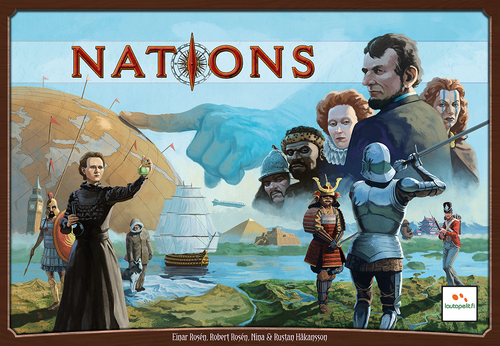
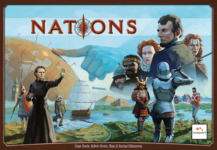
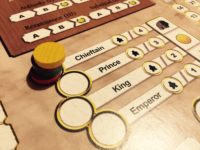
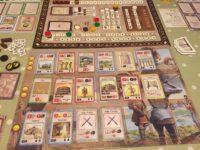
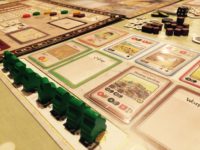
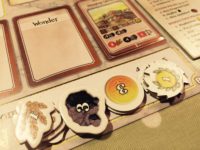


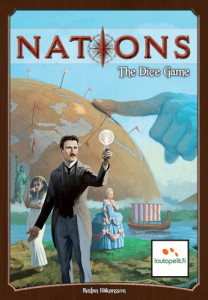
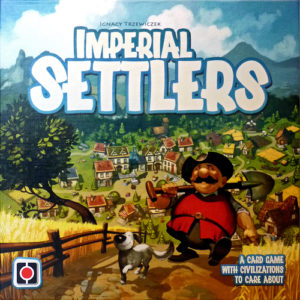
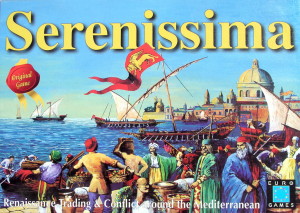
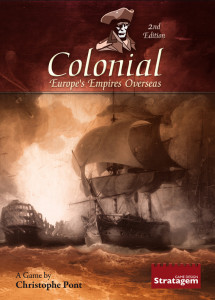
Sam says
I enjoyed Nations and I doff my cap to it for its wealth of depth and replayability. I think the production slightly lets it down, because it's not a beautiful looking game - and this in part (as well as the fact that each nation can build any wonder, so the Romans can construct the pyramids for instance) contributed to the sense I had of managing abstract mechanics, rather than overseeing the advance of an actual culture. A little too abstract for my tastes, but a very well designed game all the same. If you like the idea of Nations but want something a little faster-moving, then its little brother Nations: The Dice Game could be worth a look, or the even simpler Tribes: Early Civilization.